Android项目架构
从功能需求、设计模式、最佳实践出发考虑
MVP模式
数据、显示、控制解耦,mosby,作者blog1,blog2
依赖注入
- 普通数据注入,Dagger
- View注入ButterKnife。
数据存储
squidb,基于注解,编译期生成DAO类,model类是编译期生成的,而不是定义表结构的类,对复杂SQL语句的支持非常好- DBFlow,基于注解,编译期生成DAO类,对关系的支持很好
ActiveAndroid,基于注解,运行时转换greenDAO,编译期生成辅助代码- StorIO,与rx集成,响应式DBHelper框架
网络连接处理
异步处理
- 响应式编程(rx,在java7中使用lambda语法:retrolambda),消息的发出者和响应的接收者在同一模块内,局部性、单对单
- 事件处理(EventBus,
Otto),全局性事件、一对多比较合适
测试
- 单元测试(我的印象笔记,Robolectric,使得Android代码能够在PC的JVM上运行测试,加快速度)
- 对rx的单元测试,非官方RxAssertions,官方TestSubscriber
- AndroidTDD
- 集成测试(我的印象笔记,Espresso)
持续集成
- jenkins-ci,整合代码托管工具,commit、merge request自动触发构建
工具
- 图片加载
- 模块热加载
- dynamic-load-apk,通过代理实现启动、显示、执行安装时未定义的Activity,Service,实现模块热加载
- 错误统计
- fabric,提供crash统计、以及twitter集成
- 调试
- XLog,函数调用追踪,log出参数、返回值、线程、执行时间,支持方法、类的注解;
- Fresco,chrome查看log,view heriachy,shared pref,db等;
- LeakCanary,memory leak检测工具;
- 时间
- ThreeTenBP,JSR310的java 8以前的兼容实现,比安卓的Date类等强大无数倍;
- ThreeTenABP,安卓的一个包装,init过程性能更好;
- 导航
- FragmentArgs,Fragment启动时通过Argument传递参数
- Dart,Activity之间通过Intent传递Extra参数
- Pocket Knife,Activity的Extra传递参数,SavedInstance做状态保存/恢复
- Aftermath,A simple, annotation-based Android library for generating onActivityForResult handlers.
- 动效
- rebound,通过Android系统的property transition,加上各种变换函数,实现模拟物理的动效;
- 设计
- sketch
- zeplin
Develop maintainable apps
- Libraries
选择第三方库时的考虑- Documentation: 文档是否全面
- Repository Check-ins(Stability): 稳定性、是否保持维护
- Fulfils a Need: 满足项目需求
- Domain design
- Keep code simple: OO,一个类只负责一件事
- Use MVC/MVP/MVVM Pattern
- Functional Test
- Use the tools: IDE的重构工具很强大
- Code quality
- Readability matters
- 工具
- CheckStyle
- Lint
- Findbugs
- PMD
- Refactor Gradually
- Testing
- Unit test: Every single line of code that you write should be tested. Peroid. -- Robert Martin
- Junit(...) + Mockito
- Continuous Integration
- Code coverage
Android Clean Architecture
分层结构
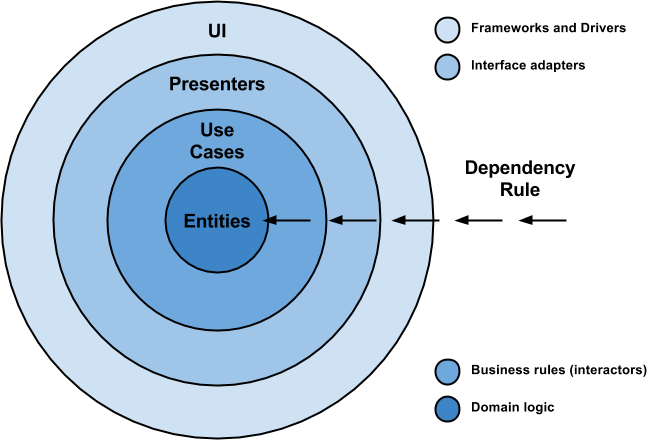
- Entities: These are the business objects of the application.
- Use Cases: These use cases orchestrate the flow of data to and from the entities. Are also called Interactors.
- Interface Adapters: This set of adapters convert data from the format most convenient for the use cases and entities. Presenters and Controllers belong here.
- Frameworks and Drivers: This is where all the details go: UI, tools, frameworks, etc.
- Dependency Rule: source code dependencies can only point inwards and nothing in an inner circle can know anything at all about something in an outer circle.
安卓项目层次结构示例
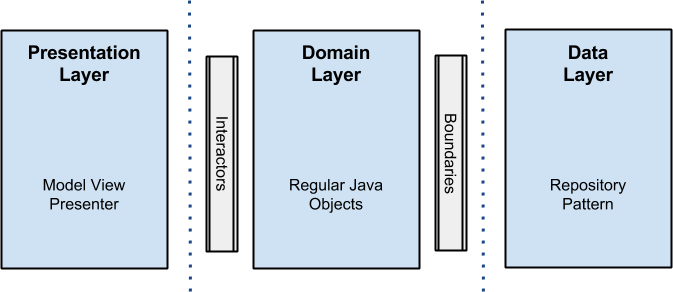
使用Rx后的层次结构示例
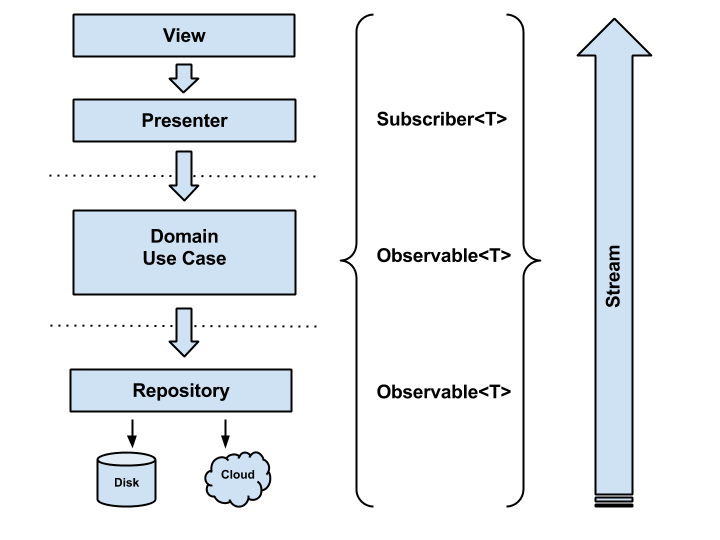
- Presentation layer: UI tests with Espresso 2 and Android Instrumentation.
- Presenter && View test: 针对接口进行单元测试;对UI简单交互结果逻辑的测试(如:Activity跳转,Fragment切换,相关接口调用);
- Domain layer: JUnit + Mockito since it is a regular Java module.
- Data layer: Migrated test battery to use Robolectric 3 + JUnit + Mockito.
代码组织(包组织)
- Package by layer
- Package by feature
- Higher Modularity
- Easier Code Navigation
- Minimizes Scope
Flux Architecture
- 结构图
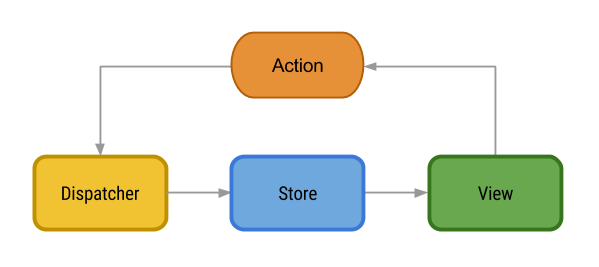
- View: Application interface. It create actions in response to user interactions. Activity or Fragment
- Dispatcher: Central hub through which pass all actions and whose responsibility is to make them arrive to every Store. An event bus.
- Store: Maintain the state for a particular application domain. They respond to actions according to current state, execute business logic and emit a change event when they are done. This event is used by the view to update its interface. Simple POJOs with two main attributes: Type: a String identifying the type of event; Data: a Map with the payload for this action.
- More about Stores
- Stores contain the status of the application and its business logic.
- Stores react to Actions emitted by the Dispatcher, execute business logic and emit a change event as result.
- ...
RxFlux
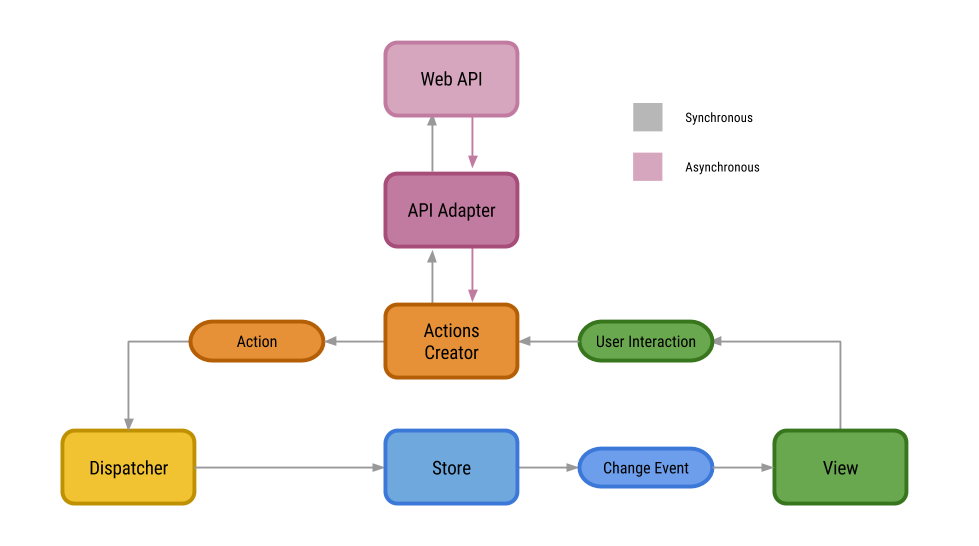
What is all this Clean Architecture jibber-jabber about?
基础
- SOLID
- Single Responsiblity
- Open/Closed
- Liskov Substitution
- Interface Segregation
- Dependency Inversion
- Abstraction
- 面向接口编程
- 高内聚,低耦合
- 内聚:单一模块内,各个部分之间的关系
- 耦合:各个模块之间的关系
- Vertical slicing
- Horizontal slicing:传统方式,从服务提供方分包,例如DB, Network, ui...
- Vertical slicing:源自敏捷,根据功能(use case)进行分包,而将与该功能相关的db, network, ui等部分放到同一个模块中